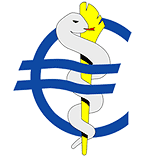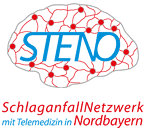Our partners
Achieving more together
DGTelemed
The German Society for Telemedicine (DGTelemed) is a nationwide association for the promotion, dissemination, and publication of modern, innovative developments, solutions and products in the telemedicine. It is a professional society for telemedicine to organize and bring together telemedicine experts. The DGTelemed supports the interdisciplinary dialog and makes it happen. Its members include hospitals, physicians, scientists, universities, research institutes, medical technology and pharmaceutical companies, consulting and service companies, health insurance companies, medical corporations, IT companies and other institutions and professionals. DGTelemed promotes contacts between its members and with partners from politics, health care,science and companies in the german and international market.

Zentrum für Telemedizin e.V. Bad Kissingen
The Association Center for Telemedicine eV is to provide a wide range of information about telemedicine, especially in rural areas, and to support the dissemination of developments. Regional, supraregional and international partnerships are to be set up in order to advance developments and to put them into practice.

gematik – Gesellschaft für Telematikanwendungen der Gesundheitskarte mbH
Gematik mbH is an investment company of the leading organizations of the German health care system and was founded in 2005. Its legal mandate is the introduction, maintenance and further development of the telematics infrastructure in the health sector, the electronic health card (eGK) as well as the associated telematics applications for the data communication between insured persons, health professionals and payers. Gematik develops the comprehensive IT standards necessary for the introduction of the electronic healthcare card. The aim is to establish and operate a common communication infrastructure for all parties involved in the healthcare sector. It is the test center and approval body for industrial components and services of the telematics infrastructure for future operations and has operational responsibility.

Physicians Network GO IN eV
The Physicians network GO IN eV is one of the largest practice networks in Germany with 464 network physicians (specialists and general practitioners). The physicians of GO IN work closely with all healthcare providers in the region (eg hospitals, social services, pharmacies and physiotherapists, etc.).

University of Ansbach
The University of Ansbach, the latest university in Bavaria, has meanwhile grown dynamically to almost 3,000 students. Right from the beginning, the topic of telemedicine was anchored in the degree program “Business Administration” focusing in the area of health management. With the establishment of new degree programs such as “Industrial Biotechnology” and “Biomedical Engineering”, additional competencies could be establiItd at the university. In the media program “Departmental Journalism” the subject Telemedicine is the content of the course. Various initiatives were actively supported, such as the stroke project “STENO” in northern Bavaria. Telemedical aspects are also conveyed in “Multimedia and Communication”.
Overall, Ansbach University of Applied Sciences can contribute to the field of telemedicine with its multimedia orientation and its engineering expertise.

Degree of Biomedical Engineering of the University of Ansbach
In biomedical engineering, devices, systems or software are developed to support modern medicine. The bachelor program Biomedical Engineering was offered for the first time in the winter semester 2009/10 and is the first independent study program of (bio-)medical technology at colleges / universities of applied sciences in Bavaria. The program is interdisciplinary and practice-oriented. It covers basic knowledge in natural and engineering sciences, diagnostic and therapeutic issues in medicine, as well as contents from business administration and important legal aspects.

Hypertension Center Munich, Excellence Center of the European Society of Hypertension
The Hypertension Center is awarded by the European Professional Society as the Hypertension Excellence Center of the European Society of Hypertension (ESH). It is headed by Prof. Middeke, who has been involved in hypertension research for more than 30 years.

IDC Research Institute of the Wilhelm Löhe University Fürth
The Wilhelm Löhe University of Applied Sciences (WLH) offers three bachelor degree programs in the growth sector of the health and social economy at the interface of care, technology, ethics and economics. The WLH-based research institute IDC is active in various research projects in the areas of telematics, telemedicine and the TeleCare sector. As part of the BMBF-funded top-level cluster Medical Valley EMN, the IDC is a member of the project association “Barrier-Free Health Assistance”, which is tasked with researching a combined product / service system for caring for the elderly and those elderly affected with dementia (TeleCare). Research results are transferred to the courses “E-health” and “Ambient Assisted Living”. The goal is to enable future graduates to independently develop telemedical care concepts and corresponding services.

Institute for Academic Further Education of the Technical University Ingolstadt
The Institute for Continuing Education offers professionals the ideal opportunity for further education. Here, both trained professionals can acquire a bachelor’s degree while working part-time and academics can round off their profile with a master’s degree.

Association of Statutory Health Insurance for Physicians of Bavaria
The Association of Statutory Health Insurance of Physicians of Bavaria, together with its members helps more than 24,000 Bavarian physicians and psychotherapists as a public corporation. It also ensures nationwide outpatient care in this federal state. In all areas, as well as in health telematics, it is important to keep the balance between the implementation of legal requirements and the representation of interests of their members. Telematics and treatment are not contradictions in this task, but essential means for the exercise of the medical activity. Constructively and carefully accompanying future technological innovation is a challenge.

Hospital Ingolstadt
Medical competence, first-class care and individual care – every patient is in good hands at Ingolstadt Hospital. The best possible treatment and therapy are guaranteed by the nationally and internationally recognized physicians in the clinics and institutes as well as the clerical clinics. The interdisciplinary cooperation of the individual specialists enables comprehensive medical care and advice. Even in unpredictable emergencies there is always a specialist on site, and short transport routes increase comfort.

Chair of Health Management of the Friedrich-Alexander-University Erlangen-Nürnberg
The Chair of Health Management of the Friedrich-Alexander-University (FAU) Erlangen-Nürnberg, directed by Prof. Dr. med. Oliver Schöffski, is engaged in research and teaching. Particular with the economic and organizational issues of the German health care system. The main areas of research are health services research and the evaluation of health care measures of all kinds, the so-called health economic evaluations. These measures include telemedicine care concepts and AAL technologies. In addition, there is a great deal of commitment in the training of specialists and executives in the health care system. In this context, a supplementary elective module “Age-appropriate assistance systems and AAL” was launched in 2013.
Chair of Business Informatics at the Technical University of Munich
The Chair of Business Informatics has existed for 26 years. It was originally founded in 1987 at the University of Hohenheim. In 2002, Prof. Dr. Helmut Krcmar the reputation of the Technical University of Munich, where the chair is located at the Faculty of Computer Science. Since then, the chair has grown continuously, in January 2014, it included 32 employees. These are assigned in each case to one of four research clusters, which are supervised by a research group leader.

NEVAS: The Neurovascular Care Network for Southwest Bavaria
NEVAS, approved by the Bavarian Hospital Planning Committee and financed by the Bavarian health insurers, is a merger of the three neurovascular center clinics, Hospital of the University of Munich, Hospital Ingolstadt and District Hospital Günzburg and 15 regional cooperation clinics at district level. NEVAS is mandated to ensure the comprehensive coverage of stroke patients at the highest level in the Southwest Bavaria region. NEVAS represents a further development of classic telemedicine stroke networks. In NEVAS, in addition to classical modules such as the establishment of a supply structure for stroke patients on site, or the telemedical acute assessment of a patient by a stroke specialist of the counseling centers, also takes into account the specialized maximum neurovascular supply. This is achieved by targeted transfers of patients within the network. NEVAS can be seen as a blueprint for how modern networked medicine can be lived.

Network Medical Technology of the University of Landshut
The application-oriented network medical technology of the University of Applied Sciences Landshut includes partners from the fields of medicine, science and politics. In terms of content, the network covers a wide range of forms of events with medical applications, especially in the area of minimally invasive imaging, point-of-care devices for emergency use, new materials, medical assistance systems as well as applications in telemedicine and data networking. One focus is on connecting regional companies that want to strengthen and expand medical technology as a business area. In addition to joint technology scouting with clinics, rescue services and users of medical technologies, as well as the initiation of research and development projects, another focus is the qualification of companies in the field of quality management and cross-border cooperation.

Private Tele-Ophthalmological Institute Erlangen (TOI) in the Medical Valley Center
The Private Tele-Ophthalmologic Institute Erlangen is an association of ophthalmologists who have telemedical images and data. This makes it possible to carry out telemonitoring in cooperation with Talking eyes & more GmbH for internistic, general medical or neurological institutions and comprehensive eye screening with telemedical findings in companies, sports clubs and nursing homes. The examinations of the tele-eye consonant are based on special photographic images of the anterior and posterior aspect of the eye, visual acuity, contrast sensitivity, stereopsis, intraocular pressure and visual field. This gives a very valid picture of vision, possible retinal vascular changes, vision-threatening early changes such as glaucoma or macular degeneration or degeneration of retinal neurons in neurodegenerative diseases such as Parkinson’s disease, multiple sclerosis or Alzheimer’s disease. The recorded images and data will be with the use of telemedicine interpreted by an ophthalmologist and summarized in a doctor’s letter. All images and findings are accessible to physicians consenting to patient consent. Since 2002, more than 70,000 patients have been examined. The Tele-Ophthalmologic Institute Erlangen has been combining ophthalmology with modern information technology for many years and offers knowledge and experience in the field of eye and health care. The Tele-Ophthalmological Institute Erlangen works together with Talkingeyes & more GmbH, the chair of pattern recognition, the Department of Radio Frequency Engineering, the Institute of Sports Science and Sport, the Interdisciplinary Institute of Ophthalmological Preventive Medicine and Imaging of the Friedrich-Alexander-University Erlangen-Nuremberg and numerous ophthalmologists, general practitioners and internists (cardiologists) throughout Germany. The concept was awarded several prizes: 2006 Medical Technology Prize of the City of Erlangen, 2008 eHealth Prize of the University of Bayreuth and 2012 Karl-Storz Telemedicine Prize. Tele-Augenkonsil has a modular structure and has several examination options, which can be put together depending on the task. the Interdisciplinary Institute for ophthalmological preventive medicine and imaging of the Friedrich-Alexander-University Erlangen-Nuremberg and numerous ophthalmologists, general practitioners and internists (cardiologists) throughout Germany.

The stroke network with telemedicine in northern Bavaria STENO
The Stroke Network with Telemedicine in Northern Bavaria STENO makes it possible to treat patients with stroke in the supply region of Northern Bavaria and Southern Thuringia with a state-of-the-art treatment. STENO is anchored as part of the standard care in the Bavarian hospital plan and is funded by the Bavarian government. Under the coordination of the Neurological Clinic of the University Hospital Erlangen, 18 clinics for regular and priority care in Central, Upper and Lower Franconia, Upper Palatinate and Southern Thuringia cooperate with the nationwide stroke treatment centers in Bayreuth, Erlangen and Nuremberg. The three centers provide 24-hour, 365 day-a-year hands-on experience. Experienced neurologists for teleconsil evaluation and treatment of acute strokes in the clinics of the network. In addition, a stroke unit was set up in each hospital which can work over the network. Patients are looked after by a specialized interdisciplinary team of doctors, nurses and therapists. In the case of a required transfer, the three centers are available with all the possibilities of maximum care. The entire network is certified according to the internationally certified quality standard DIN EN ISO 9001: 2015 for its uniform inter-facility quality management.
